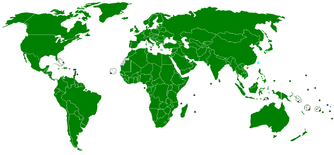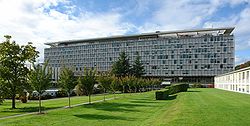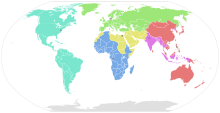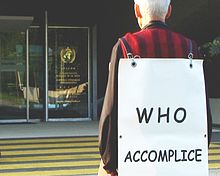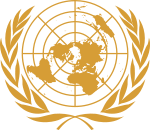- World Health Organization
-
"WHO" redirects here. For other uses, see Who (disambiguation).

World Health Organization
منظمة الصحة العالمية
世界卫生组织
Organisation mondiale de la Santé
Всемирная организация здравоохранения
Organización Mundial de la Salud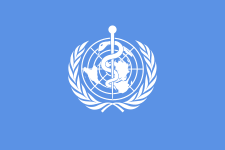
Flag of the World Health OrganizationOrg type Specialized agency of the United Nations Acronyms WHO Head Dr. Margaret Chan Status Active Established 7 April 1948 Headquarters Geneva, Switzerland Website www.who.int Parent org ECOSOC The World Health Organization (WHO) is a specialized agency of the United Nations (UN) that acts as a coordinating authority on international public health. Established on 7 April 1948, with headquarters in Geneva, Switzerland, the agency inherited the mandate and resources of its predecessor, the Health Organization, which was an agency of the League of Nations.[1] It is a member of the United Nations Development Group.[2]
Contents
Constitution and history
The WHO's constitution states that its objective "is the attainment by all people of the highest possible level of health."[3] The flag features the Rod of Asclepius as a symbol for healing.
The World Health Organization (WHO) is one of the original agencies of the United Nations, its constitution formally coming into force on the first World Health Day, (7 April 1948), when it was ratified by the 26th member state. Jawaharlal Nehru, a major freedom fighter of India had given an opinion to start WHO.[4] Prior to this its operations, as well as the remaining activities of the League of Nations Health Organization, were under the control of an Interim Commission following an International Health Conference in the summer of 1946.[5] The transfer was authorized by a Resolution of the General Assembly.[6] The epidemiological service of the French Office International d'Hygiène Publique was incorporated into the Interim Commission of the World Health Organization on 1 January 1947.[7]
Activities
Apart from coordinating international efforts to control outbreaks of infectious disease, such as SARS, malaria, tuberculosis, influenza, and HIV/AIDS, the WHO also sponsors programs to prevent and treat such diseases. The WHO supports the development and distribution of safe and effective vaccines, pharmaceutical diagnostics, and drugs, such as through the Expanded Program on Immunization. After over two decades of fighting smallpox, the WHO declared in 1980 that the disease had been eradicated – the first disease in history to be eliminated by human effort.[8] The WHO aims to eradicate polio within the next few years.
The organization develops and promotes the use of evidence-based tools, norms and standards to support Member States to inform health policy options. It oversees the implementation of the International Health Regulations, and publishes a series of medical classifications including the International Statistical Classification of Diseases (ICD), the International Classification of Functioning, Disability and Health (ICF), and the International Classification of Health Interventions (ICHI).[9] The WHO regularly publishes a World Health Report including an expert assessment of a specific global health topic.[10] The organization has published tools for monitoring the capacity of national health systems[11] and health workforces[12] to meet primary health care goals. The organization has endorsed the world's first official HIV/AIDS Toolkit for Zimbabwe (from 3 October 2006), making it an international standard.[citation needed]
In addition, the WHO carries out various health-related campaigns – for example, to boost the consumption of fruits and vegetables worldwide[13] and to discourage tobacco use.[14] Each year, the organization marks World Health Day focusing on a specific health promotion topic.
WHO conducts or supports health research in areas of communicable diseases, reproductive health,[15] non-communicable conditions and injuries, neglected tropical diseases,[16] health policy and systems,[17] and other areas, as well as improving access to health research and literature in developing countries such as through the HINARI network.[18] The organization relies on the expertise and experience of many world-renowned scientists and professionals to inform its work, such as the WHO Expert Committee on Biological Standardization, the WHO Expert Committee on Leprosy, and the WHO Study Group on Interprofessional Education & Collaborative Practice.
The WHO also promotes the development of capacities in Member States to use and produce research that addresses national needs, by bolstering national health research systems and promoting knowledge translation platforms such as the Evidence-Informed Policy Network (EVIPNet). WHO and its regional offices are working to develop regional policies on research for health - the first one being the Pan American Health Organization/Regional Office for the Americas (PAHO/AMRO) that had its Policy on Research for Health approved in September 2009 by its 49th Directing Council Document CD 49.10.[citation needed]
The World Health Organization's suite of health studies is working to provide the needed health and well-being evidence through a variety of data collection platforms, including the World Health Survey[19] covering 308,000 respondents aged 18+ years and 81,000 aged 50+ years from 70 countries, and the Study on Global Ageing and Adult Health (SAGE)[20] covering over 50,000 persons aged 50+ across almost 23 countries. The WHO Assessment Instrument for Mental Health Systems (WHO-AIMS),[21] the WHO Quality of Life Instrument (WHOQOL),[22] and the Service Availability Mapping (SAM) tool[23] provide guidance for data collection in other health and health-related areas. Collaborative efforts between WHO and other agencies, such as through the Health Metrics Network, serve the normative functions of setting high research standards.
WHO has also worked on global initiatives in surgery such as the Global Initiative for Emergency and Essential Surgical Care[24] and the Guidelines for Essential Trauma Care[25] focused on access and quality. Safe Surgery Saves Lives[26] addresses the patient safety in surgical care. The WHO Surgical Safety Checklist is in current use worldwide in the effort to improve safety in surgical patients.
Main publications
- Bulletin of the World Health Organization
- Eastern Mediterranean Health Journal
- Human Resources for Health, journal published in collaboration with BioMed Central
- Pan American Journal of Public Health
- World Health Report, series of global health policy reports
Main international policy frameworks
- International Health Regulations
- International Code of Marketing of Breast-milk Substitutes, adopted in 1981
- Framework Convention on Tobacco Control, adopted in 2003
- Global Code of Practice on the International Recruitment of Health Personnel, adopted in 2010
Structure
The WHO has 193 Member states,[27] including 192 members of the UN (all except Liechtenstein), the Cook Islands and Niue.
Non-state territories of UN Member States may join as Associate Members (with full information but limited participation and voting rights) if approved by an Assembly vote: Puerto Rico and Tokelau are Associate Members.[28]
The following states and entities were granted observer status: Palestine[29] (a UN observer), Holy See[30] (UN observer), Order of Malta[30] (UN observer) and the Republic of China (Taiwan, under the name of "Chinese Taipei").[31]
Non-members of the WHO are Liechtenstein and the rest of states with limited diplomatic recognition.
WHO Member States appoint delegations to the World Health Assembly, WHO's supreme decision-making body. All UN member states are eligible for WHO membership, and, according to the WHO web site, “other countries may be admitted as members when their application has been approved by a simple majority vote of the World Health Assembly.”[27]
The WHO Assembly generally meets in May each year. In addition to appointing the Director-General every five years, the Assembly considers the financial policies of the Organization and reviews and approves the proposed programme budget. The Assembly elects 34 members, technically qualified in the field of health, to the Executive Board for three-year terms. The main functions of the Board are to carry out the decisions and policies of the Assembly, to advise it and to facilitate its work in general.
The WHO is financed by contributions from member states and donors. In recent years, the WHO's work has involved increasing collaboration with external bodies; there are currently around 80 partnerships ("official relations" and "working relations")[30] with NGOs and the pharmaceutical industry, as well as with foundations such as the Bill and Melinda Gates Foundation and the Rockefeller Foundation. By 2007, voluntary contributions to the WHO from national and local governments, foundations and NGOs, other UN organizations, and the private sector, were more than double the level of assessed contributions (dues) from the 193 member nations.[32]
In addition to the observer states and entities listed above, the UN observer organizations International Committee of the Red Cross and International Federation of Red Cross and Red Crescent Societies have entered into "official relations" with the WHO and are invited as observers. In the World Health Assembly they are seated along the other NGOs.[30]
Regional offices
Uncharacteristically for a UN Agency, the six Regional Offices of the WHO enjoy remarkable autonomy. Each Regional Office is headed by a Regional Director (RD), who is elected by the Regional Committee for a once-renewable five-year term. The name of the RD-elect is transmitted to the WHO Executive Board in Geneva, which proceeds to confirm the appointment. It is rare that an elected Regional Director is not confirmed.
Each Regional Committee of the WHO consists of all the Health Department heads, in all the governments of the countries that constitute the Region. Aside from electing the Regional Director, the Regional Committee is also in charge of setting the guidelines for the implementation, within the region, of the Health and other policies adopted by the World Health Assembly. The Regional Committee also serves as a progress review board for the actions of the WHO within the Region.
The Regional Director is effectively the head of the WHO for his or her Region. The RD manages and/or supervises a staff of health and other experts at the regional headquarters and in specialized centres. The RD is also the direct supervising authority—concomitantly with the WHO Director General—of all the heads of WHO country offices, known as WHO Representatives, within the Region.
The Regional Offices are:
- Regional Office for Africa (AFRO)I, with headquarters in Brazzaville, Republic of Congo. AFRO includes most of Africa, with the exception of Egypt, Sudan, Tunisia, Libya, Somalia and Morocco, which belong to EMRO.[33]
- Regional Office for Europe (EURO), with headquarters in Copenhagen, Denmark. Israel is served by EURO.
- Regional Office for South East Asia (SEARO), with headquarters in New Delhi, India. North Korea is served by SEARO.
- Regional Office for the Eastern Mediterranean (EMRO), with headquarters in Cairo, Egypt. EMRO includes the countries of Africa, and particularly in the Maghreb, that are not included in AFRO, as well as the countries of the Middle East, except for Israel. Pakistan is served by EMRO.
- Regional Office for Western Pacific (WPRO), with headquarters in Manila, Philippines. WPRO covers all the Asian countries not served by SEARO and EMRO, and all the countries in Oceania. South Korea is served by WPRO.
- Regional Office for the Americas (AMRO), with headquarters in Washington, D.C., USA. It is better known as the Pan American Health Organization (PAHO). Since it predates the establishment of WHO, PAHO is by far the most autonomous of the 6 regional offices.
WHO liaison and other offices
WHO has a number of specialist offices/agencies, as well as liaison offices at the most important international institutions.[34]
- IARC, International Agency for Research on Cancer (Lyon, France)
- WHO Centre for Health Development – WHO Kobe Center (Kobe, Japan)
- WHO Lyon Office for National Epidemic Preparedness and Response (LYO) (Lyon, France)
- WHO Mediterranean Centre for Vulnerability Reduction (Tunisia)
- WHO Office at the African Union and the Economic Commission for Africa (Addis Ababa, Ethiopia)
- WHO Liaison Office in Washington (USA)
- WHO Office at the European Union (Brussels, Belgium)
- WHO Office at the United Nations (New York, USA)
- WHO Office at the World Bank and the International Monetary Fund (Washington, USA)
Country offices
The World Health Organization operates 147[35] country and liaison offices in all its regions. The presence of a country office is generally motivated by a need, stated by the member country. There will generally be one WHO country office in the capital, occasionally accompanied by satellite-offices in the provinces or sub-regions of the country in question.
The country office is headed by a WHO Representative (WR), who is an internationally experienced physician or other health professional, not a national of that country, who holds diplomatic rank and is due privileges and immunities similar to those of an Ambassador Extraordinary and Plenipotentiary. In most countries, the WR (like Representatives of other UN agencies) is de facto and/or de jure treated like an Ambassador – the distinction here being that instead of being an Ambassador of one sovereign country to another, the WR is a senior UN civil servant, who serves as the "Ambassador" of the WHO to the country to which he or she is accredited. Hence, the title of Resident Representative, or simply Representative. The WR is member of the UN system country Team which is coordinated by the UN system resident Coordinator.
The country office consists of the WR, and several health and other experts, both foreign and local, as well as the necessary support staff. The main functions of WHO country offices include being the primary adviser of that country's government in matters of health and pharmaceutical policies.
International liaison offices serve largely the same purpose as country offices, but generally on a smaller scale. These are often found in countries that want WHO presence and cooperation, but do not have the major health system flaws that require the presence of a full-blown country office. Liaison offices are headed by a liaison officer, who is a national from that particular country, and place without diplomatic immunity.
People
Director-General
The head of the organization is the Director-General (DG), appointed by the World Health Assembly.
The current DG is Margaret Chan, who was appointed on 9 November 2006.
Former DGs include Lee Jong-wook (in office 2003-2006), Gro Harlem Brundtland (1998–2003), Hiroshi Nakajima (1988–1998), Halfdan T. Mahler (1973–1988), Marcolino Gomes Candau (1953–1973), and Brock Chisholm (1948–1953).
Anders Nordström was Acting DG for six months in 2006 following the death of Dr Lee while in office.
Staffing
The World Health Organization is an agency of the United Nations and as such shares a core of common personnel policy with other UN agencies.
In support of the principle of a tobacco-free work environment the WHO will not recruit cigarette smokers.[36] The organization had successfully rallied 168 countries to sign the Framework Convention on Tobacco Control in 2003.[37] The Convention is designed to push for effective legislation and its enforcement in all countries to reduce the harmful effects of tobacco.
Goodwill Ambassadors
International film star Jet Li was appointed a WHO Goodwill Ambassador by Director-General Margaret Chan on 3 April 2009.[38]
American Nancy Brinker was appointed Goodwill Ambassador for Cancer Control on 26 May 2009.
Chinese vocal artist, Ms Peng Liyuan, was appointed Goodwill Ambassador for Tuberculosis and HIV/AIDS on 3 June 2011.[39]
Controversies
IAEA - Agreement WHA 12-40
In 1959, the WHO signed Agreement WHA 12-40 with the International Atomic Energy Agency (IAEA), which some have claimed prevents the WHO from independently researching the effects on human health of radiations caused by the use of nuclear power, for examples after nuclear disasters. The agreement states - specifically in Article 1, Paragraph 2 - that the WHO recognises the IAEA as having responsibility for peaceful nuclear energy without prejudice to the roles of the WHO of promoting health. However, the following paragraph adds: "Whenever either organization proposes to initiate a programme or activity on a subject in which the other organization has or may have a substantial interest, the first party shall consult the other with a view to adjusting the matter by mutual agreement."[40] This last statement, which stresses the requirement for mutual agreement, has led some observers to question whether this effectively jeopardizes the WHO's independence when assessing matters relating to nuclear power.[41][42]
Condom promotion, religion and AIDS
Main article: Roman Catholic Church and AIDSIn 2003, the WHO denounced the Roman Curia's health department's opposition to the use of condoms, saying: "These incorrect statements about condoms and HIV are dangerous when we are facing a global pandemic which has already killed more than 20 million people, and currently affects at least 42 million."[43]
In 2009, the World Health Assembly President, Guyana's Health Minister Leslie Ramsammy, condemned Pope Benedict's call for ending condom use in the fight against AIDS, saying he was trying to "create confusion" and "impede" proven strategies in the battle against the disease.[44]
Intermittent Preventive Therapy
The aggressive support of the Bill & Melinda Gates Foundation for intermittent preventive therapy of malaria which included the commissioning a report from the Institute of Medicine triggered a memo from the former WHO malaria chief Dr. Akira Kochi.[45] Dr. Kochi wrote, “although it was less and less straightforward that the health agency should recommend IPTi, the agency’s objections were met with intense and aggressive opposition from Gates-backed scientists and the foundation”.
Diet and sugar intake
Some of the research undertaken or supported by WHO to determine how people's lifestyles and environments are influencing whether they live in better or worse health can be controversial, as illustrated by a 2003 joint WHO/FAO report on nutrition and the prevention of chronic non-communicable disease,[46] which recommended that sugar should form no more than 10% of a healthy diet. This report led to lobbying by the sugar industry against the recommendation, to which the WHO/FAO responded by including in the report the statement "The Consultation recognized that a population goal for free sugars of less than 10% of total energy is controversial", but also stood by its recommendation based upon its own analysis of scientific studies.[47][48]
2009 influenza pandemic
In 2007, the WHO organized work on pandemic influenza vaccine development through clinical trials in collaboration with many experts. A pandemic involving the H1N1 influenza virus was declared by Director-General Margaret Chan in April 2009, but by the post-pandemic period critics claimed the WHO had exaggerated the danger, spreading "fear and confusion" rather than "immediate information".[49] Industry experts counter that the 2009 pandemic had led to "unprecedented collaboration between global health authorities, scientists and manufacturers, resulting in the most comprehensive pandemic response ever undertaken, with a number of vaccines approved for use three months after the pandemic declaration. This response was only possible because of the extensive preparations undertaken in during the last decade."[50]
See also
- Global health
- Global Mental Health
- Health for all
- Health promotion
- International Health Regulations
- International standards for drinking water
- Millennium Development Goals
- Pan American Health Organization
- Public health
- World Health Day
- High 5 Project, a patient safety collaboration
- Healthy city / Alliance for Healthy Cities, an international alliance
- Health Sciences Online, virtual learning resources
- Open Learning for Development, virtual learning resources
References
- ^ League of Nations: Health Organization http://whqlibdoc.who.int/hist/chronicles/health_org_1931.pdf
- ^ http://www.undg.org/index.cfm?P=13
- ^ "Constitution of the World Health Organization" (PDF). World Health Organization. http://whqlibdoc.who.int/hist/official_records/constitution.pdf. Retrieved 18 July 2007. – For an easier to read version see "Constitution of the World Health Organization (English only version)" (PDF). World Health Organization. http://www.who.int/entity/governance/eb/who_constitution_en.pdf. Retrieved 11 February 2008.
- ^ "Chronicle of the World Health Organization, April 1948" (PDF). World Health Organization. pp. 54. http://whqlibdoc.who.int/hist/chronicles/chronicle_1948.pdf. Retrieved 18 July 2007.
- ^ "Chronicle of the World Health Organization, 1947" (PDF). http://whqlibdoc.who.int/hist/chronicles/chronicle_1947.pdf. Retrieved 18 July 2007.
- ^ United Nations General Assembly Resolution 61 session 1 Establishment of the World Health Organization on 14 December 1946
- ^ Iriye, Akira (2002). Global Community: The Role of International Organizations in the Making of the Contemporary World. Berkeley: University of California Press. ISBN 052023179.
- ^ World Health Organization. Anniversary of smallpox eradication. Geneva, WHO Media Centre, 18 June 2010.
- ^ The WHO Family of International Classifications.
- ^ WHO. The World Health Report. Geneva.
- ^ Monitoring the building blocks of health systems: a handbook of indicators and their measurement strategies. Geneva, World Health Organization, 2010 http://www.who.int/healthinfo/systems/monitoring/en/index.html
- ^ Handbook on monitoring and evaluation of human resources for health. Geneva, World Health Organization, 2009 http://www.who.int/hrh/resources/handbook/en/index.html
- ^ WHO. Global Strategy on Diet, Physical Activity and Health: Promoting fruit and vegetable consumption around the world. Geneva.
- ^ WHO. Health topics: Tobacco. Geneva.
- ^ Special Programme of Research, Development and Research Training in Human Reproduction
- ^ WHO TDR Research on neglected priority needs
- ^ WHO Alliance for Health Policy and Systems Research
- ^ HINARI Access to Research in Health Programme
- ^ WHO World Health Survey.
- ^ WHO Study on global AGEing and adult health (SAGE).
- ^ WHO. Mental Health: WHO-AIMS
- ^ World Health Organization. WHOQOL-BREF: Introduction, Administration, Scoring and Generic Version of the Assessment. Geneva, 1996.
- ^ WHO. Service Availability Mapping (SAM).
- ^ http://www.who.int/surgery/globalinitiative/en/
- ^ http://www.who.int/violence_injury_prevention/services/traumacare/en/
- ^ http://www.who.int/patientsafety/safesurgery/en/
- ^ a b WHO. Countries. Accessed 21 June 2011.
- ^ "Appendix 1, Members of the World Health Organization (at 31 May 2009)". World Health Organization. http://apps.who.int/gb/bd/PDF/bd47/EN/members-en.pdf. Retrieved 18 November 2010.
- ^ WHO Palestine status
- ^ a b c d World Health Organization By Gian Luca Burci, Claude-Henri Vignes
- ^ Taiwan Today, Taiwan delegation to participate in WHA: "The 15-member delegation will participate in the WHA as an observer under the name “Chinese Taipei.”"
- ^ WHO Resources 2006-2007.
- ^ Ahmad S. Teebi, Genetic Disorders Among Arab Populations, (Springer: 2010), p.69.
- ^ WHO liaison and other offices.
- ^ http://www.who.int/about/structure/en/index.html
- ^ "WHO Employment – Who we need". World Health Organization. http://www.who.int/employment/who_we_need/en/. Retrieved 12 July 2011.
- ^ Framework Convention on Tobacco Control.
- ^ World Health Organization. Jet Li, WHO Goodwill Ambassador. Geneva, 2009.
- ^ World Health Organization. WHO appoints Chinese singer and health activist as Goodwill Ambassador. WHO Media Centre Statement, 3 June 2011.
- ^ World Health Organization. "Agreements with Other Intergovernmental Organizations". http://apps.who.int/gb/bd/PDF/BDenglish/Agreements.pdf. Retrieved 19 April 2011.
- ^ Independence for WHO. "Appeal by health professionals for independence of the World Health Organization". http://www.ippnw-europe.org/commonFiles/pdfs/Atomenergie/appeal_healthprofessionals.pdf. Retrieved 19 April 2011.
- ^ Women in Europe for a Common Future. "Open letter on the WHO/IAEA Agreement of 1959". http://www.wecf.eu/download/2010/04/letterIAEA-WHO.pdf. Retrieved 19 April 2011.
- ^ Vatican: condoms don't stop Aids. Posted by The Guardian, Oct 2003.
- ^ World Health Assembly: Pope Benedict "wrong". Posted by AFP. Mar 21, 2009.
- ^ New York Times, 16 February 2008 Gates Foundation’s Influence Criticized By DONALD G. McNEIL Jr.
- ^ Report of a Joint FAO/WHO Consultation. Diet, nutrition and the prevention of chronic diseases. Geneva: World Health Organization; 2003 (WHO Technical Report Series 916).
- ^ Mann J. "Sugar revisited – again." Bulletin of the World Health Organization 2003, 81(8).
- ^ U.N. sticks to advice to limit sugar intake; against threats from sugar industry. Posted by Active Low-Carber Forums, 2003-04-22.
- ^ WHO admits errors in handling flu pandemic: Agency accused of overplaying danger of the virus as it swept the globe. Posted by msnbc.com
- ^ Abelina A et al. "Lessons from pandemic influenza A(H1N1): The research-based vaccine industry’s perspective." Vaccine 29 (2011) 1135–1138.
External links
- World Health Organization
- Weekly Epidemiological Record (WER)
- Multi-country Study on global AGEing and adult health (SAGE)
United Nations (UN) UN System History League of Nations · Peacekeeping missions (history · timeline) · Enlargement
Major offices Programmes and
agenciesFAO · ICAO · ILO · IMO · IPCC · IAEA · UNIDO · ITU · UNAIDS · SCSL · UNCTAD · UNCITRAL · UNDCP · UNDG · UNDP · UNDPI · UNEP (OzonAction, UNEP/GRID-Arendal) · UNESCO · UNODC · UNFIP · UNFPA · OHCHR · UNHCR · UNHRC · UN-HABITAT · UNICEF · UNITAR · UNOSAT · UNRWA · UN Women · UNWTO · UPU · WFP · WHO · WMO
Resolutions Related topics Bretton Woods system · Charter · Delivering as One · Flag · Honor Flag · Global Compact · ICC · Laissez-Passer · OPCW · Treaty Series · UN Day · UDHR · MDGs · UN reform
Categories:- World Health Organization
- Organizations established in 1948
- Organisations based in Geneva
- Global health
- United Nations specialized agencies
- Public health organizations
- United Nations Development Group
Wikimedia Foundation. 2010.

